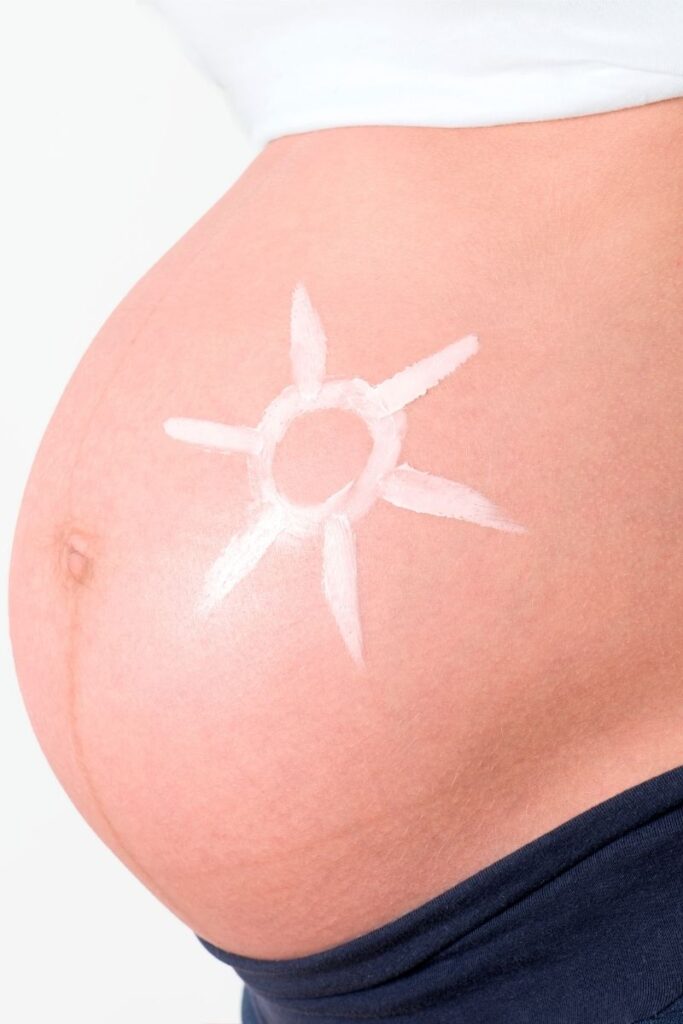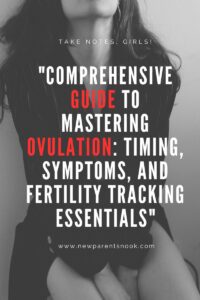Some links on our blog are affiliate links, meaning at no extra cost to you, we may earn a commission if you purchase through them. We participate in the Amazon Affiliate Program, and we recommend products we believe in. Your support helps us keep providing valuable content. Thank you!
Pregnancy is a beautiful yet complex journey, bringing about various changes to your body, including your skin.
During this sensitive period, it’s crucial to adapt your skincare routine to protect both your well-being and that of your unborn child.
Here, we’ll guide you through safe, gentle skincare practices and recommend products designed to nurture your changing skin without compromising safety.
Understanding Pregnancy-Sensitive Skin
Pregnancy can bring about a countless changes in a woman’s body, including changes to the skin. Hormonal fluctuations during pregnancy can lead to increased sensitivity, making the skin more reactive to products and ingredients that were previously well-tolerated. Understanding these changes can help in managing sensitive skin during pregnancy more effectively.
Common Skin Changes During Pregnancy
Increased Sensitivity: Due to hormonal changes, your skin may become more sensitive and prone to irritation. Products that were once compatible may now cause redness, itching, or breakouts.
Melasma or Chloasma: Often referred to as the “mask of pregnancy,” this condition causes dark, discolored patches on the skin, primarily on the face. It’s exacerbated by sun exposure, making sunscreen an essential product during pregnancy.
Stretch Marks: As the body expands to accommodate the growing baby, stretch marks may appear on the abdomen, breasts, hips, and thighs. Keeping the skin moisturized can help manage their appearance.
Acne: Hormonal fluctuations can lead to an increase in oil production, resulting in acne breakouts, even for those who may not have struggled with acne before.
Varicose Veins and Spider Veins: Increased blood volume and pressure from the growing uterus can lead to the development of varicose veins and spider veins, primarily in the legs.
Safe Ingredients and Products
1. Hydration Heroes: Gentle Cleansers and Moisturizers
During pregnancy, it’s crucial to choose skin care products that are safe and gentle, as your skin can be more sensitive and susceptible to reactions. It’s also essential to avoid ingredients that could harm your developing baby.
Here are some general guidelines for selecting gentle cleansers and moisturizers during pregnancy:

Gentle Cleansers
Hydrating Cleansers: Look for cleansers labeled as hydrating or moisturizing. These are usually cream or lotion-based and are less likely to strip your skin of its natural oils.
Soap-Free Cleansers: Soap-free formulas are less likely to irritate or dry out your skin. They maintain the skin’s natural pH balance.
Non-Comedogenic: Choose products labeled non-comedogenic to avoid clogging pores, especially if you’re experiencing pregnancy-related changes in your skin, such as increased oiliness or acne.
Natural Ingredients: Ingredients like aloe vera, chamomile, and cucumber can be soothing for sensitive skin. However, be cautious with essential oils and herbal extracts, as some may not be recommended during pregnancy.
Moisturizers
- Fragrance-Free: Fragrances can irritate sensitive skin, so it’s best to use fragrance-free products.
- Hypoallergenic: These products are formulated to minimize the risk of allergic reactions and are suitable for sensitive skin.
- Ingredients to Look For: Hyaluronic acid, glycerin, ceramides, and niacinamide are beneficial ingredients in moisturizers for hydrating and supporting the skin barrier without being too harsh.
- SPF Protection: If your moisturizer is also your daily sunscreen, look for physical (mineral) sunscreens with zinc oxide or titanium dioxide, as they are considered safer for pregnant women.
Ingredients to Avoid
- Retinoids: Found in anti-aging and acne treatments; not recommended during pregnancy.
- High-Dose Salicylic Acid: Small amounts (as in a face wash) might be safe, but high-dose or oral forms should be avoided.
- Hydroquinone: Used for skin lightening, hydroquinone has high systemic absorption and is best avoided during pregnancy.
- Phthalates and Parabens: These are potential endocrine disruptors. Opt for products labeled as phthalate-free and paraben-free.
- Essential Oils: Some essential oils can be too potent and are not recommended during pregnancy. Always check if an essential oil is safe before use.
Before trying any new product, it’s a good idea to do a patch test on a small area of skin to check for any adverse reactions. Additionally, discussing skincare products with your healthcare provider is always recommended to ensure they are safe for you and your baby during pregnancy.
Clinique Dramatically Different Moisturizing Gel, Cetaphil Face Wash and CeraVe Night Cream offer great options for sensitive skin, focusing on hydration and maintaining the skin’s natural balance.
2. Combatting Hormonal Acne: Azelaic Acid
Azelaic acid is considered a safer option for treating acne and hyperpigmentation during pregnancy. It’s a naturally occurring acid found in grains like wheat, rye, and barley, and it works by killing acne-causing bacteria, unclogging pores, and reducing inflammation.
Additionally, azelaic acid can help to fade pigmentation, which may be particularly beneficial for those experiencing melasma (also known as the “mask of pregnancy”), a condition characterized by dark, discolored patches on the skin.

Safety Profile
- Pregnancy Category B: Azelaic acid is categorized as Class B by the FDA, indicating that animal reproduction studies have not demonstrated a risk to the fetus, and there are no adequate and well-controlled studies in pregnant women. However, this category suggests it is generally considered safe during pregnancy.
- Topical Use: Since azelaic acid is applied topically and has minimal systemic absorption, it is less likely to have an effect on the fetus compared to oral medications.
Usage Recommendations
- Concentration Levels: Azelaic acid is available in over-the-counter formulations (usually around 10% concentration) and prescription strengths (up to 20%). Both are considered safe during pregnancy, but it’s often recommended to start with a lower concentration to minimize potential irritation.
- Application: It can be used once or twice daily, depending on your skin’s tolerance and the advice of your healthcare provider. Always follow the product’s instructions or your healthcare provider’s recommendations.
- Patch Test: Even though azelaic acid is generally well tolerated, performing a patch test on a small area of skin before regular use is a good idea, especially during pregnancy when your skin may be more sensitive.
Benefits for Pregnant Women
- Treats Acne: Effective against both inflammatory and non-inflammatory acne without the risks associated with other acne treatments that are not safe during pregnancy.
- Reduces Hyperpigmentation: Helps to even out skin tone by fading dark spots and melasma, which are common during pregnancy due to hormonal changes.
Precautions
- Skin Irritation: Some people may experience mild skin irritation, such as redness, dryness, or tingling. These symptoms are usually temporary and diminish as your skin adjusts to the treatment.
- Sun Sensitivity: While azelaic acid doesn’t significantly increase sun sensitivity, wearing sunscreen is crucial during pregnancy to protect against melasma and UV damage.
As with any skincare treatment during pregnancy, it’s important to consult with your healthcare provider before starting azelaic acid to ensure it’s appropriate for your skin type and pregnancy. They can provide personalized advice and dosage recommendations.
The Ordinary offers a high-quality Azelaic Acid Suspension that’s effective yet gentle on sensitive skin.
3. Sun Protection: Mineral Sunscreens
Mineral sunscreens are a preferred choice during pregnancy due to their safety profile and mechanism of action. Unlike chemical sunscreens, which absorb UV rays, mineral sunscreens sit on the skin’s surface and physically block or deflect UV radiation. This is achieved through the use of active mineral ingredients, typically zinc oxide and titanium dioxide.
These ingredients are considered safe for pregnant women and are less likely to cause skin irritation, making them ideal for those with sensitive skin or who are concerned about the effects of chemical filters on their developing baby.

Benefits of Mineral Sunscreens
- Broad-Spectrum Protection: Mineral sunscreens provide broad-spectrum coverage, meaning they protect against both UVA and UVB rays. UVA rays can prematurely age your skin, while UVB rays can burn your skin. Both types of rays contribute to skin cancer.
- Safety: Zinc oxide and titanium dioxide are FDA-approved for use in sunscreens and are recognized as safe and effective. They are less likely to be absorbed into the skin than chemical filters, minimizing systemic exposure.
- Suitability for Sensitive Skin: Mineral sunscreens are often well-tolerated by those with sensitive skin, including pregnant women, because they are less likely to cause irritation or allergic reactions.
- Immediate Protection: Unlike chemical sunscreens, which need to be applied 20-30 minutes before sun exposure to be effective, mineral sunscreens protect from the sun as soon as they are applied.
Things to Consider When Choosing a Mineral Sunscreen
- Formulation: Look for a “non-nano” formulation of zinc oxide and titanium dioxide, as these are less likely to penetrate the skin and are believed to be safer for marine life if you swim in natural bodies of water.
- SPF Rating: Choose a sunscreen with an SPF of 30 or higher for effective protection. Reapply every two hours or after swimming or sweating, according to the product’s instructions.
- Water Resistance: If you plan to swim or sweat, look for water-resistant options. Remember that “water-resistant” does not mean “waterproof,” and reapplication is necessary after swimming or sweating.
- Tinted Formulas: Some mineral sunscreens come in tinted formulations to help offset the white cast that zinc oxide and titanium dioxide can leave on the skin, making them more cosmetically appealing for everyday use.
Additional Sun Protection Measures
While sunscreen is an essential part of protecting your skin from the sun, it’s also important to take additional measures, especially during pregnancy when your skin may be more sensitive to sun exposure:
- Wear Protective Clothing: Long-sleeved shirts, pants, and wide-brimmed hats can provide additional protection.
- Seek Shade: Especially during the hours of 10 a.m. and 4 p.m. when the sun’s rays are strongest.
- Use Sunglasses: Protect your eyes from UV radiation by wearing sunglasses that block UVA and UVB rays.
Choosing the right sunscreen and practicing sun safety are crucial during pregnancy to protect your skin and your developing baby. Always consult with your healthcare provider if you have concerns about which sunscreen is best for you during pregnancy.
Look for broad-spectrum sunscreen with at least SPF 30, like those from EltaMD, which are designed for sensitive skin.
4. Stretch Mark Solutions: Natural Oils
While it’s difficult to prevent stretch marks entirely, keeping your skin well-moisturized can reduce their appearance.
Natural oils like almond oil, coconut oil, and shea butter are excellent for increasing skin elasticity.

Natural oils can be a soothing and effective way to moisturize and care for your skin during pregnancy, especially as your body undergoes various changes. However, it’s essential to choose oils that are safe and beneficial for both you and your developing baby. Here are some widely recommended natural oils for use during pregnancy:
1. Coconut Oil
- Benefits: Deeply moisturizes the skin, can help prevent stretch marks, has antimicrobial properties.
- Usage: Apply directly to the skin as a moisturizer or use as a carrier oil for safer essential oils.
2. Sweet Almond Oil
- Benefits: Rich in Vitamin E, keeps skin hydrated and supple, may help prevent stretch marks.
- Usage: Ideal for all-over body application or as a base for homemade skincare recipes.
3. Jojoba Oil
- Benefits: Mimics the skin’s natural oils, deeply hydrating, can help balance skin’s oil production.
- Usage: Works well as a facial moisturizer or body oil.
4. Olive Oil
- Benefits: High in antioxidants and healthy fats, moisturizes skin, can improve skin elasticity.
- Usage: Best used as a part of your body care routine; however, be cautious as it can be comedogenic (pore-clogging) for some people.
5. Argan Oil
- Benefits: High in Vitamin E and essential fatty acids, improves skin elasticity, can help prevent stretch marks.
- Usage: Suitable for face and body; absorbs quickly without leaving a greasy residue.
6. Avocado Oil
- Benefits: Rich in vitamins A, D, and E, deeply nourishing, promotes collagen synthesis, and helps with skin healing.
- Usage: Good for dry skin areas or as a belly oil to support skin stretching.
Precautions and Safe Use
- Patch Test: Always perform a patch test on a small area of your skin to check for any allergic reactions or sensitivities.
- Purity: Choose cold-pressed, unrefined oils whenever possible, as they retain more of their natural benefits.
- Essential Oils: Be cautious with essential oils during pregnancy, as some can be harmful. Always dilute essential oils with a carrier oil (like those listed above) and consult with a healthcare provider before use.
- Nut Allergies: If you have nut allergies, be cautious with oils derived from nuts (like sweet almond oil) and opt for alternatives like jojoba or coconut oil.
Using natural oils can be a delightful and effective way to care for your skin during pregnancy. They offer a simple, chemical-free option for moisturizing and improving skin elasticity, potentially helping with issues like dry skin and stretch marks. As with any new product or regimen during pregnancy, it’s wise to consult with your healthcare provider before starting to ensure it aligns with your health needs and pregnancy safety guidelines.
Bio-Oil is another popular choice that’s specifically formulated to help improve the appearance of stretch marks.
Tips for a Safe Skincare Routine During Pregnancy
- Patch Test New Products: Your skin may react differently to products during pregnancy. Always patch test new skincare items to ensure they don’t cause irritation.
- Avoid Harmful Ingredients: Steer clear of retinoids, high-dose salicylic acid, certain essential oils, and chemical sunscreens, as these can be harmful during pregnancy.
- Stay Hydrated and Eat a Balanced Diet: External skincare is vital, but so is nourishing your body from the inside. Drinking plenty of water and eating a nutrient-rich diet can significantly impact your skin’s health.
- Consult with a Healthcare Provider: Before starting any new skincare product or routine, it’s always best to consult with your dermatologist or healthcare provider, especially during pregnancy.

Embrace Your Natural Glow
Pregnancy is a time of immense change, and while it may bring about new skin challenges, it’s also a period to embrace your body’s natural beauty.
By selecting safe, gentle products and adjusting your skincare routine, you can maintain healthy, glowing skin throughout your pregnancy journey.
Every pregnancy is unique, and what works for one person may not work for another. It’s about finding what’s best for you and your baby, ensuring you both remain safe and well-cared for during this special time.







